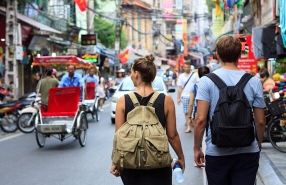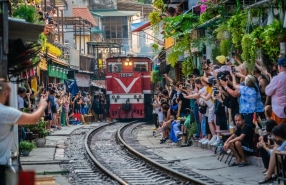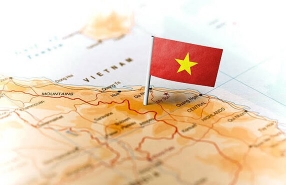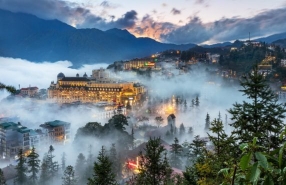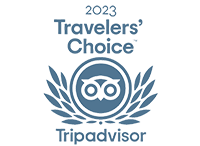Sapa Or Moc Chau: Which One To Visit On Your Vietnam Northern Trip?

Planning a travel itinerary in northern Vietnam can be challenging with so many beautiful destinations like Sapa and Moc Chau. While Sapa is famous for its majestic nature, with enormous mountains and vast rice terraces, Moc Chau invites you to explore its lush tea hills, high plateaus, and charming villages. This blog will help you decide between Sapa and Moc Chau for your next trip to Vietnam!
Table of Contents
I. Overview of Sapa and Moc Chau
In northern Vietnam, you’ll find the mountainous region which is always an ideal destination for nature lovers. Among its remarkable sites, Sapa and Moc Chau stand out for their diverse landscapes, breathtaking natural beauty, and a mild, cool climate year-round.
Sapa is a highland district located in the Lao Cai province in northwest Vietnam, about 320 km from Hanoi. Situated at an altitude of 1,500 meters, Sapa enjoys a cool climate throughout the year. When visiting this area, you can admire the majestic splendor of nature, harmoniously complemented by human creativity in agricultural work. This blend creates a magnificent natural scene that astonishes all visitors.
As for Moc Chau, beyond its natural assets and climate, this destination attracts many travelers due to its proximity to Hanoi, being only 200 km away. This makes it a perfect choice for short getaways. In just a few hours' drive, you can leave behind the hustle and bustle of the capital to find the tranquility and poetic charm of Moc Chau’s nature, with its rice paddies and lush green tea fields year-round.
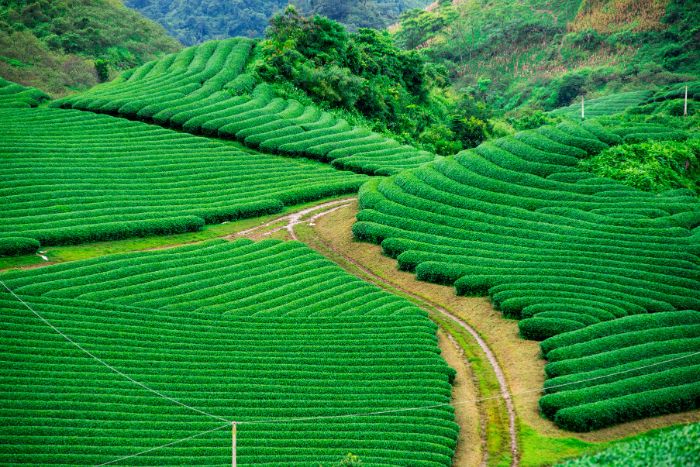
II. Why visit Sapa - the town in the mist?
1. Admire wonderful natural sites
When traveling to Sapa, you cannot ignore this misty town's iconic and stunning natural landmarks. You’ll have the chance to visit Mount Fansipan, the “Roof of Indochina” and the highest mountain in Southeast Asia. Additionally, Sapa boasts many other natural attractions, such as Heaven’s Gate, O Quy Ho Pass, Silver Waterfall, Ham Rong Mountain, and Muong Hoa Valley, among others.
In addition, the rice terraces in Sapa are especially captivating for visitors. They showcase the beauty of nature intertwined with the skillful craftsmanship of local farmers, leaving tourists in awe.
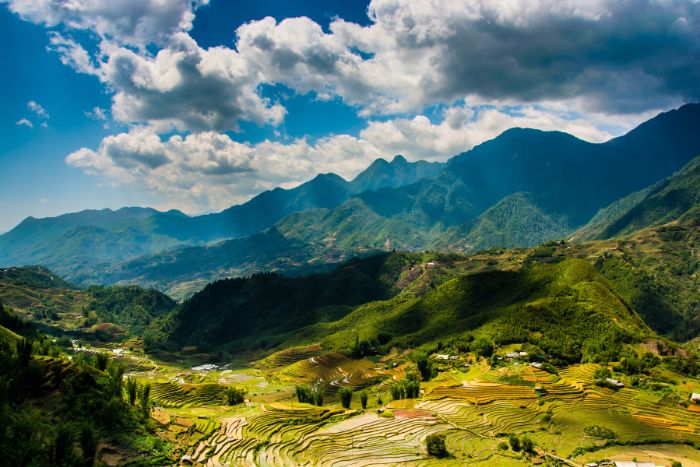
2. Savor Northwestern culinary specialties
Another highlight of Sapa lies in its unique flavors of the Northwest Vietnam cuisine. Dishes in Sapa are simply prepared, using ingredients that locals grow or forage themselves in the forest. Notable specialties include thang co (a dish made with horse meat), Bac Ha sour pho (different from traditional pho), dried buffalo meat, and Sapa salmon. You can enjoy these dishes in local villages or at the ethnic market in Sapa, where their flavors are sure to surprise you.
3. Meet diverse ethnic groups
The Sapa villages and ethnic markets also provide excellent opportunities to encounter the wide variety of ethnic groups living in the region. You’ll find Tay, Nung, Dao, Hmong, Giay, and others, each with their own language, customs, and distinct culture. These interactions will enrich your journey, adding a unique cultural dimension. Each group is easily recognizable by their traditional attire with distinctive patterns, bringing vibrant colors and charm to Sapa.

III. Why visit Moc Chau - the green pearl?
1. Travel easily and save time
Compared to the time it takes to reach Sapa (about 6 hours by road or even an overnight train from Hanoi), Moc Chau is much more accessible for travelers, as it’s only 200 km from Hanoi. In just 4 hours by car, you can escape the urban hustle and arrive at the green pearl of Moc Chau, making it an ideal destination for a 2-day, 1-night getaway. The mountain roads leading to Moc Chau wind along the slopes, allowing visitors to enjoy breathtaking landscapes along the way.
2. Immerse yourself in poetic Nature
Unlike Sapa, known for its towering mountains and wild natural scenery, Moc Chau offers a softer, more poetic natural setting. Less developed as a tourist destination, the area retains a more peaceful and romantic atmosphere. Among Moc Chau’s iconic sites is the famous heart-shaped tea hill, a natural work of art created by the skilled and creative hands of the locals. Other must-see spots include the Dai Yem Waterfall, the Na Ka Plum Valley, the Pha Luong Peak, the pine forest in Ban Ang Village, and the Moc Chau Bat Cave. All these locations will make your trip to Vietnam more authentic and memorable.
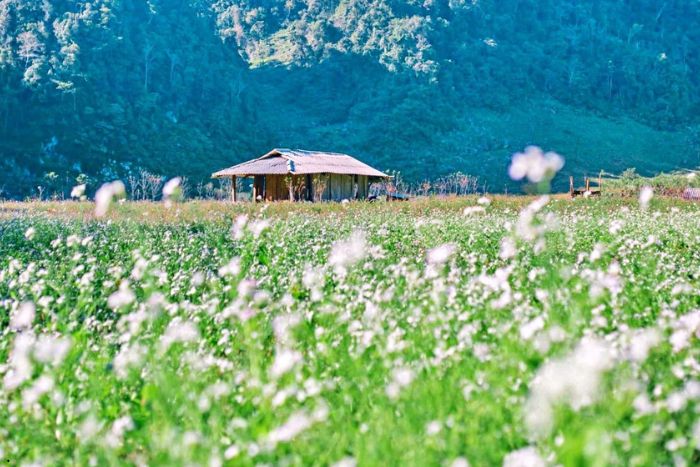
IV. Suggested travel itinerary for Sapa and Moc Chau
If you're leaving from the capital Hanoi, the trip to Moc Chau is faster than to Sapa. For those with less travel time, Moc Chau is an excellent choice for a 2-day, 1-night stay with the following itinerary:
- Day 1: Hanoi – Moc Chau – Dai Yem Waterfall – Bach Long Glass Bridge – Moc Chau Night Market
- Day 2: Heart-shaped Tea Hill – Mai Chau Village – Hanoi
If your schedule is more flexible, consider Sapa instead with 3-day or longer tours, such as the highlights Sapa 4 days itinerary:
- Day 1: Hanoi – Night train to Sapa
- Day 2: Lao Cai – Sapa – Ma Tra Village
- Day 3: Sapa – Cat Cat Village – Y Linh Ho Village – Lao Chai Village – Ta Van Village
- Day 4: Ta Van Village – Sapa – Bus to Hanoi
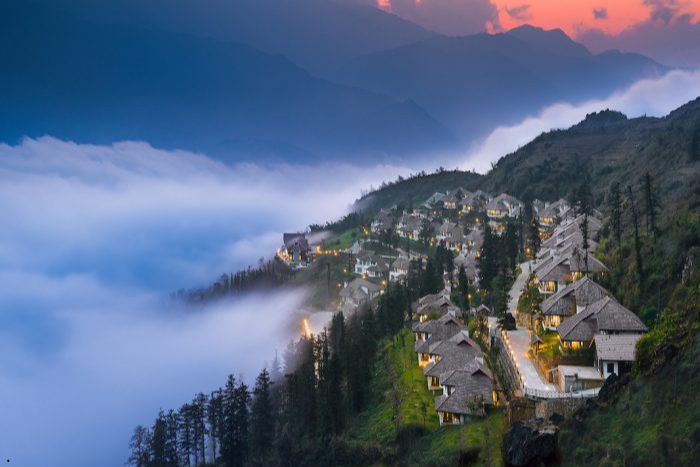
Whether in Sapa or Moc Chau, many exceptional sites are waiting to be explored. Besides the time and budget, the activities and experiences offered should match your travel style too. Contact Autour Asia, your Vietnam travel company, for any questions. And get ready for an unforgettable journey to this beautiful country!
You can refer to this blog Sapa 5 days itinerary for more information. A 5-day itinerary includes :
- Visiting Cat Cat and Sin Chai villages and other ethnic villages for cultural experiences and meeting ethnic people.
- You can also extend your trekking adventure through Ho Stream, Silver Waterfall, and take a cable car to Fansipan Mountain.
- Do not miss the chance to visit ethnic markets in Sapa or Bac Ha, you can interact with locals, and savor traditional cuisine.
5 days in Sapa will offer you an unforgettable adventure with its breathtaking landscapes and vibrant cultural experiences.
The climate in Sapa and Moc Chau is cool year-round. However, each period in these two destinations has its unique beauty.
The best time to visit Sapa is from September to November, during the cool and dry autumn season, with fresh air and rice terraces in the harvest season, turning the entire landscape golden.
In Moc Chau, aside from the harvest season in October, from November to February, various flowers bloom, creating a highly romantic atmosphere in the region.
Related travel guide
Other similar articles
CUSTOMIZABLE BY LOCAL EXPERTS
Personalized trip at the original price!
REFUND GUARANTEE
We believe in our work and promise to give you money back.
GOOD PRICE / QUALITY
95% satisfied more than expected!
24/7 LOCAL SUPPORT
We are always available online to provide assistance at any time.
Most read articles
Autour Asia is highly recommended on
Embracing the mission of "Satisfied more than expected" and providing authentic experiences, we have received numerous recommendations on reputable travel forums:













